Vernell Sultenfuss (nee Heimann)
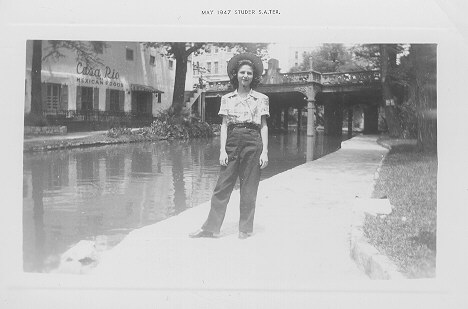
Devine, Texas
April
13, 2002
Robin Sultenfuss
Palo Alto
College
History 1302 - Spring 2002
INTRODUCTION
TRANSCRIPTION
Where were you born and raised?I was born in
Did you have any brothers or sisters?
I had three sisters and one brother, I was the second oldest, I had one
sister older than me, and my brother was the second youngest.
We lived in town for a while; my daddy had kind of a shop for upholstery, car upholstery and car painting, (pause) but than it burned down. Then I think for a while we lived with my grandmother, it was when I was younger, can't remember any more. They lived about 18 miles outside of
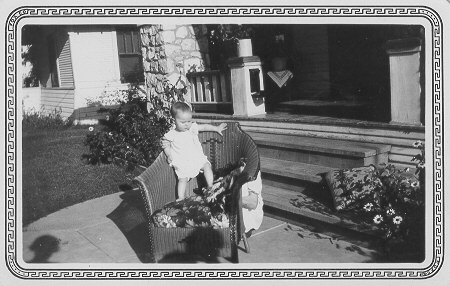
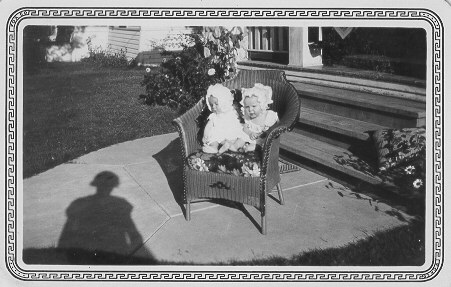
Was your family well off in the depression?
Both my grandparents had farms, my mother's side during the depression,
that was before I was even born, she and her sister went to San
Antonio and worked for rich people, and cooked and
cleaned houses so they could save their farm. So they didn't lose their farm,
some people lost their farms; I guess they owed money on them.
They grew cotton, and I think they used to take it Louisiana.
By wagon?
I
don't know if they went by wagon or not. I remember sitting under the cotton
wagon and crying because it was hot (she laughs). They were eight children in
the family and they were all picking cotton. So everybody’s kids were all
around we had a lot of cousins. We had good times just playing with our cousins
is what we did. We didn't really have much recreation, we just had to do our own
and we had house parties, what we used to call house parties. Some of the older people that could play an instrument and the other people danced, and they would
probably stay all night. I remember lying and sleeping in another room while
they had a good time dancing in the other rooms (she laughs). So that was the
house party type thing.
I know you play the accordion, where did you learn to play the
instrument?
I got it for Christmas when I was about seven or eight, and I just taught
myself to play it. My mother could play to organ a little bit. I guess before
the depression they had music lessons She played the organ and I'd keep asking
her “Am I playing this right" or” does this sound right" so she
helped me get the melody started out. That’s how I taught myself I guess
you'd say. My sister played the guitar for a while, my cousins they all played
instruments. Then we'd get together and play, make our own music. We didn't have
a radio until we came to
Well I don't remember it being as hot as it is now. I guess from the cars, and air toxins, or maybe we were use to it, I don't know. In the summer we always had clothes covering us, I don't remember wearing long sleeves, but I always wore a bonnet over my head to keep cool. The houses were made were the widows would catch the wind, and make a breeze through the house. When it was hot, my grandmother would fix all the children a pallet in the middle of the floor and we would sleep in the coolest part of the house. Some people even slept on the porch outside. Without electricity how did ya'll keep your food cold?
Well we really didn't have cold food like they have now. We had what you called and icebox, we did have a little bit that we could keep fresh for a while. But we milked our own cow and they had what you called a butchers clubs, in those days, and the neighbors would all get together and butcher and everyone would get so much that they could eat up within a certain amount of time with out it spoiling. And I think the women canned a lot of the meat too. They did a lot of canning. Canned a lot of the meat. And we studied by kerosene lanterns, we had kerosene lanterns and wood stoves to cook on. They use to make their own bread; mother always baked bread, even when we came to San Antonio.
Did you make a lot of your own food?
We did when we lived in Fredericksburg and when we lived in San
Antonio. My daddy always had a garden. He liked to make
gardens, and he was good at it making gardens. We always had fresh vegetables.
Mother canned and we’d get peaches from up at Fredericksburg, and put up peach
preserves and all the stuff. A lot of people canned and had victory garden that
was what they called them at that time.
Milk, of course, they had a lot of dairies around
Yea, my mother did. She made lye soap, her and my grandmother, they made the lye soap in the big iron pots they used to heat their water outside. They had big kettles, the big kettles you see outside in people's yards, like the one I have out there. They built the fire, got your water hot, and cooked the clothes (she laughs), and they really came out white, but they made the soap in those pots too. They used grease and lye. Well I guess you’ve seen them at the fairs, they show you how to make them, and they used to make the soap. That’s what they washed with until they had more modern soaps, started in the 40’s and 50’s. Everyone got washing machines. Electric ones, then when the electricity was out in the country. Then they started washing with electric. They had this outside washing machine where you pulled the handle and agitated it by hand. My grandmother had one of those. It was really something in those days. You had to crank the wringer. What they called the wringer, where you put the clothes through. You’d wash all your clothes in one pot. You’d start out with the white clothes, then the color clothes, and then the dark clothes, and you’d just use one pot of water for that, and that conserved water that way. When you rinse them, you had two or three pots to rinse them in. You had to wring them all, some by hand, if the wringer didn’t work good. Then you used your hand and the rub board was handy in those days too.
Did you have to iron most of your
clothes?
Yes we did, and we starched a lot. We use to starch all those clothes and
iron. Some people even ironed their bed linens. I don’t know if we ever did
too much of that. The rich people, I guess they had maids that did that. Women
use to spend all their time ironing, washing, and cooking.
Well I can’t remember too much because I worked. Maybe if you had children, then you were expected to stay at home. I worked until I had your father. Then I stayed at home. Al didn’t want me to work. During the Great Depression did you buy new clothes, or what did you do for clothes?
Well my mother sewed everything, and they use to have the flour in pretty printed, colorful sacks, such as material, which was cotton material flour sacks, and she made our underwear and gowns out of that. They got some material I guess and she sewed everything and the WPA gave some clothing and I think they provided food if you needed food. I can't remember exactly. I think you could go to the grocery stores and you were allowed certain allotments. Did you dad always have steady job, was it hard to find work?
Well, uh, he became an alcoholic and so it was hard for him to keep a job, mostly was his problem. And he messed up his job at Kelly Field because of that, otherwise he would have had a good pension, you know and everything later on. But he always was able to get a job, he had a good personality I guess, and always found a job (she shakes her head and laughs). He provided fairly good for everybody and after we got older and could go out and work on our own, well that helped. Where did you work at?
I worked, after we moved to
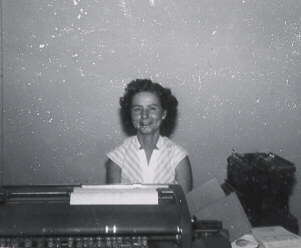
What school did you attend while you were working?
Burbank
High School. It was a vocational school at that time; it was the first
vocational school. And it was just a few years old when I started going to
school there. They grew vegetables there. They grew their own vegetables and
they had pig and calves they raised. It was like an agricultural school. Of
course, now, I guess being in
With the food that they raised, did they use that for the cafeteria food?
Yes they did. They used that for the cafeteria, they might have even sold it, I'm not too sure if they sold any of it. They probably didn't raise that much. I'm not too sure, but they did raise show calves and hogs and I guess they got so much out of that, whenever they got any awards or what ever they got. Did you have good grades in school?
I made all A’s in school. My Uncle Alfred was a mathematician, math teacher. He helped me through school. I graduated from high school I didn’t go through 12 grades because I skipped eighth and went straight in to ninth. I wanted to go to college, but we did not have the money. I enjoyed school very much, I was always reading. Even when it was time for supper, my mother would have to pull me away from a book to get me to eat. I guess that part runs in our family because all my grandchildren have good grades and plan to further their education past high school. When your family moved to
No, we always rode the bus as long as I was at home. We never got a vehicle after we moved down here. One reason, I guess was because of his drinking, he would have probably wrecked it all the time. (She laughs). And would have been picked up by the police probably. So always rode the bus. All the time we rode the bus to school and then they had a scheduled bus we rode to downtown on Houston (St.). Well it dropped us at the courthouse. From there I walked to Joske's, which was way up on the other side of town. We could have hopped a bus and got a transfer, sometimes we did that if the weather was bad and just walked only a few blocks to Joske's. Some of my friends worked like that too. They worked in different places so we all walked together and they stopped where they worked and I of course I went on to where I worked. Several people did that.
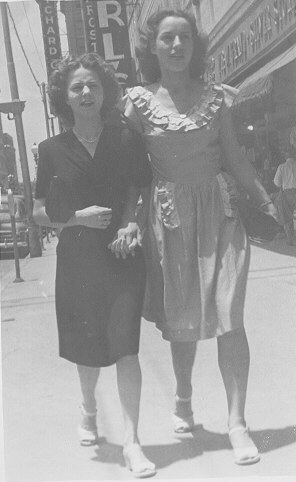
During the depression what did, what ya'll do for fun, did you see any
movies?
Well movies is something I that never saw too much of, maybe when I was
about 12 before we moved to San Antone. Than I lived closer to town and we
went to movies on Saturdays. And then they had little programs for children at
the courthouse square. On Saturdays, they had bands, and they played games.
Yah that was free, it is close to where the old round museum is now the Church was there. It was the church where all dominations went when they first settled Fredericksburg.
ANALYSIS
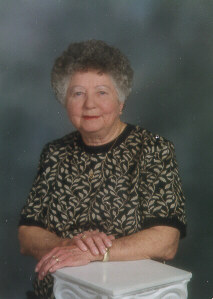
Even though her father was an alcoholic, my Oma survived fairly well during the depression. She had to live with out a few things, but she told me that she never remembers being hungry. Since her family farmed they always had a small garden to feed the family. By doing this interview, I learned many things about my Oma’s side of the family that I had not learned before. It is amazing how much you learn when you take the time to listen to the stories for the past. I never knew that my great-grandfather was an alcoholic. What is even more amazing is the fact that her father lived until age 78 with all his heavy smoking and drinking. My grandfather always loved to talk about his younger days, and quite often I heard his stories and not the ones of my Grandmother. We go to Fredericksburg once or twice a year, and my Oma’s cousin still lives on the old farm place. I know there are old buildings in the back part of the property. It will be interesting to go back there and see what memories it brings up with my Oma.
BIBLIOGRAPHY
The sites used for this project are :
http://www.fredericksburg-texas.com
Fredericksburg’s official web page.
http://www.lyesoap.com Stewart’s Craft’s home page
http://www.saisd.net/SCHOOL/high/002/002.shtm>
Luther Burbank high School’s home page
http://www.pioneermuseum.com/ Gillespie County Historical Society